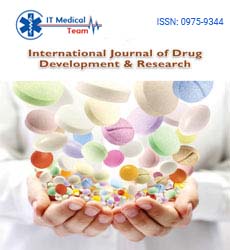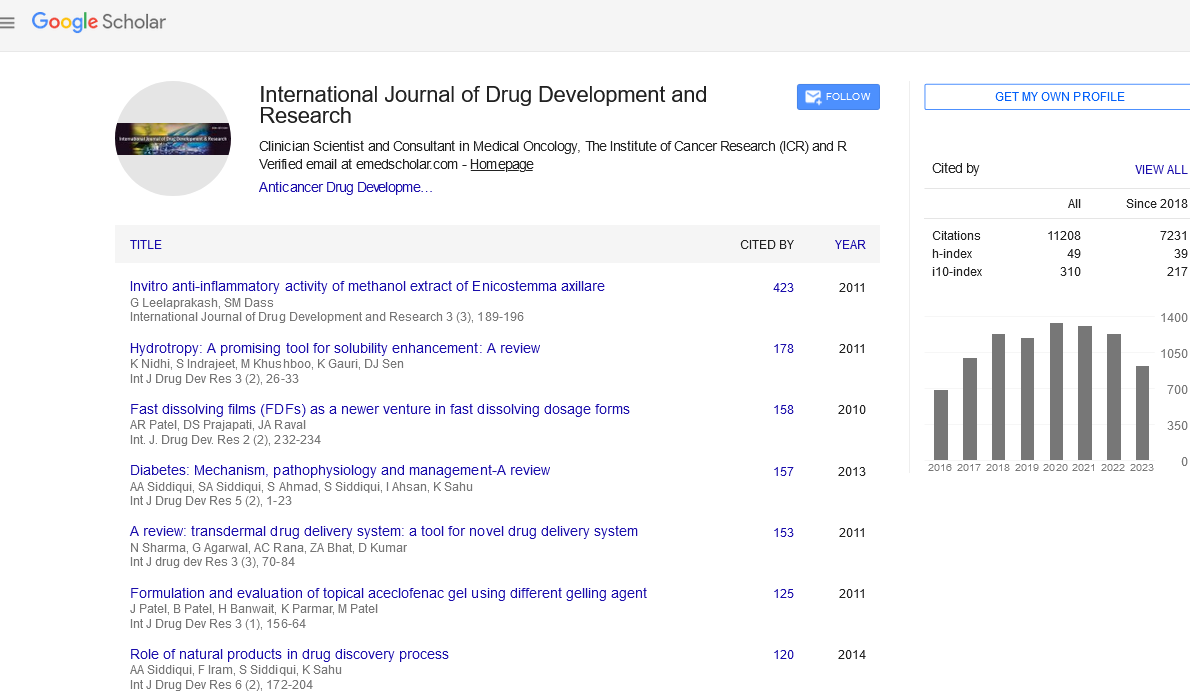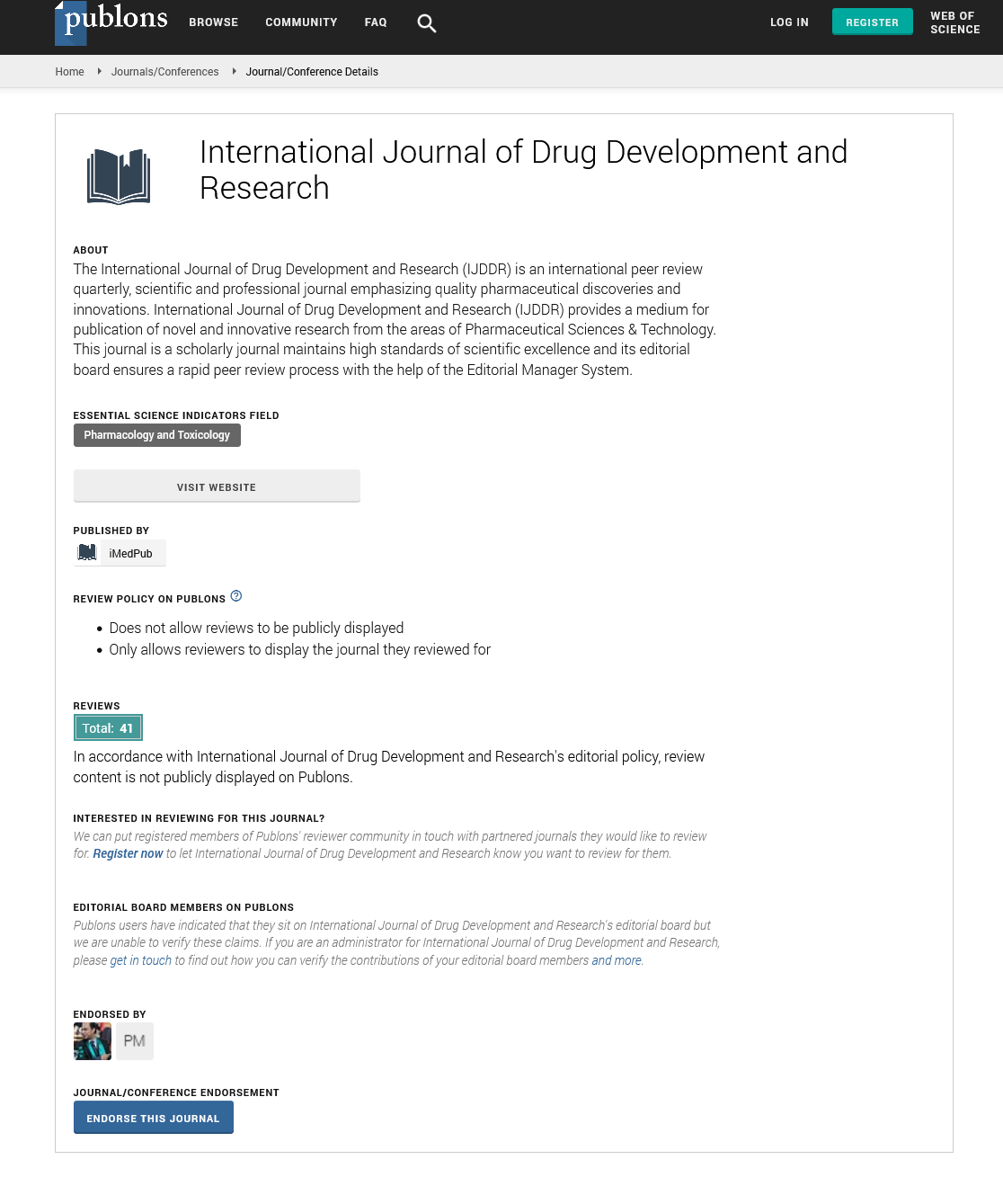Opinion - (2024) Volume 16, Issue 4
Exploring Epigenetics: A New Frontier in Drug Discovery
Harun Achmad*
Department of Neurology, Hasanuddin University, Hasanuddin, Indonesia
*Correspondence:
Harun Achmad, Department of Neurology, Hasanuddin University, Hasanuddin,
Indonesia,
Email:
Received: 10-Jul-2024, Manuscript No. IJDDR-24-15044;
Editor assigned: 12-Jul-2024, Pre QC No. IJDDR-24-15044 (PQ);
Reviewed: 26-Jul-2024, QC No. IJDDR-24-15044;
Revised: 09-Aug-2024, Manuscript No. IJDDR-24-15044 (R);
Published:
16-Aug-2024
Introduction
In the quest to understand and combat diseases, the field of
epigenetics has emerged as a promising frontier. Epigenetics, a
branch of genetics that studies changes in gene expression
caused by mechanisms other than changes in the DNA sequence
itself, offers profound insights into how genes are regulated and
how this regulation can be altered in disease states. This article
delves into the significance of epigenetics in drug discovery,
exploring its potential, current developments, challenges, and
future prospects.
Description
Understanding epigenetics
Epigenetics refers to changes in gene expression that do not
involve alterations to the underlying DNA sequence. These
changes are mediated by chemical modifications to DNA or
histone proteins, as well as by regulatory molecules such as non-coding
RNAs. Epigenetic modifications play crucial roles in
regulating gene activity, influencing processes such as cell
differentiation, development, and responses to the environment.
Key epigenetic mechanisms
DNA methylation: Addition of methyl groups to DNA, often
associated with gene silencing.
Histone modifications: Chemical alterations to histone proteins,
which affect the accessibility of DNA and thus gene expression.
Non-coding RNAs: Regulatory RNAs that can influence gene
expression by various mechanisms, including mRNA degradation
or chromatin remodeling.
Epigenetics in disease
Dysregulation of epigenetic mechanisms is increasingly
recognized as a hallmark of many diseases, including cancer,
neurological disorders, metabolic diseases, and autoimmune
conditions. For instance, aberrant DNA methylation patterns are
observed in cancer cells, contributing to the silencing of tumor
suppressor genes or activation of oncogenes. In neurological
disorders like Alzheimer's disease, changes in histone modifications
impact the expression of genes involved in neuronal function
and survival.
The role of epigenetics in drug discovery
The dynamic nature of epigenetic modifications offers unique
opportunities for therapeutic intervention. Unlike genetic
mutations, which are often difficult to reverse, epigenetic
changes are potentially reversible, making them attractive
targets for drug development. The goal of epigenetic therapies is
to restore normal gene expression patterns or silence disease-promoting
genes, thereby correcting the underlying cause of the
disease.
Epigenetic targets in drug discovery
Histone Deacetylases (HDACs): Enzymes that remove acetyl
groups from histone proteins, leading to chromatin condensation
and gene silencing. HDAC inhibitors are being investigated as
potential treatments for cancer and neurological disorders.
DNA Methyltransferases (DNMTs): Enzymes responsible for
adding methyl groups to DNA. Inhibitors of DNMTs have shown
promise in reversing abnormal DNA methylation patterns in
cancer cells.
Bromodomain and Extra-Terminal (BET) proteins: These
proteins recognize acetylated histones and play a role in gene
transcription. BET inhibitors are under investigation for their
potential in treating cancers and inflammatory diseases.
Current developments and clinical trials
The field of epigenetics in drug discovery has rapidly evolved,
with several compounds targeting epigenetic mechanisms
progressing through preclinical and clinical trials. For example,
DNMT inhibitors such as azacitidine and decitabine have been
approved for the treatment of certain types of leukemia and
myelodysplastic syndromes. HDAC inhibitors like vorinostat and
panobinostat are approved for the treatment of cutaneous T-cell
lymphoma and multiple myeloma, respectively.
Challenges in epigenetic drug discovery
Despite the promise of epigenetic therapies, several
challenges hinder their development and clinical application:
• Specificity: Ensuring that epigenetic drugs selectively target
disease-associated epigenetic changes without affecting normal
cellular functions is a significant challenge.
• Delivery: Effective delivery of epigenetic drugs to target tissues
and cells remains a hurdle, particularly in diseases affecting the
central nervous system or solid tumors.
• Resistance: Like other therapies, resistance to epigenetic drugs
can develop over time, necessitating the development of
combination therapies or second-generation agents.
Future directions and opportunities
Looking ahead, the future of epigenetics in drug discovery
holds considerable promise:
• Precision medicine: Epigenetic therapies have the potential to
be tailored to individual patients based on their unique
epigenetic profiles, leading to more personalized treatment
strategies.
• Combination therapies: Combining epigenetic drugs with
traditional therapies or immunotherapies could enhance
treatment efficacy and overcome resistance mechanisms.
• Emerging targets: Continued research into novel epigenetic
targets and mechanisms will expand the repertoire of
therapeutic options for various diseases.
Conclusion
In conclusion, epigenetics represents a revolutionary approach
to drug discovery, offering new avenues for treating diseases by
targeting the root causes of abnormal gene expression. While
challenges remain, ongoing research and clinical trials continue
to advance our understanding and application of epigenetic
therapies. As scientists unravel the complexities of epigenetic
regulation, the potential to transform patient care and outcomes
grows ever closer to realization. Epigenetics stands poised to
rede ine the landscape of medicine, ushering in an era of
personalized, targeted therapies that hold the promise of
improving the lives of patients worldwide.
Citation: Achmad H (2024) Exploring Epigenetics: A New Frontier in Drug Discovery. Int J Drug Dev Res Vol:16 No:4






